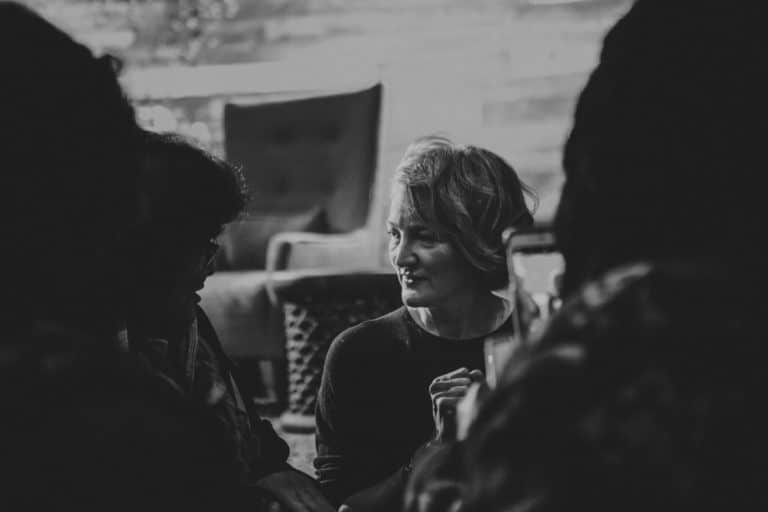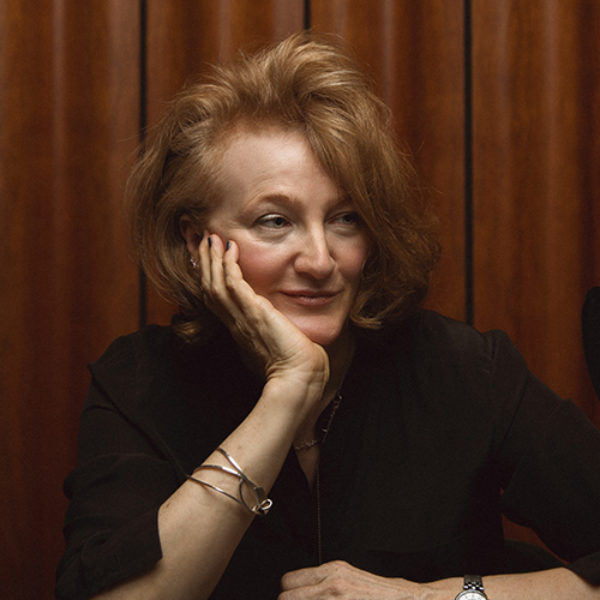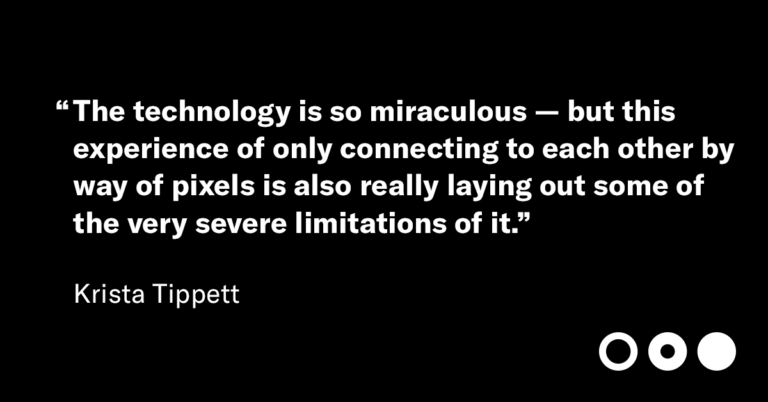
Image by Bethany Birnie, © All Rights Reserved.
Good Conversation Is an Adventure
I think of a good conversation as an adventure. You create a generous and trustworthy space for it, and prepare hospitably for it, so the other person will feel so welcome and understood that they will put words around something they have never put words around quite that way before. They will give voice to something they didn’t know they knew — and you will be a witness to thinking, revelation, in real time. This is one reason radio/podcasting is such a magical medium: everyone who listens joins that room, becomes a witness, the moment they push “play.” They are also there for the revelation. It’s a form of time travel. And if the conversation is edifying (one of my favorite, underused words), we all sync up in some mysterious way across time and space and grow a little together.
In recent years, I’ve discovered that I really like being on the other side of a conversation too. Maybe because I’ve experienced that thrill of revelation so many times, I approach someone asking questions of me with great anticipation of what they will draw out of me that I can’t draw out of myself. So, a few weeks ago, on social media, my colleagues and I asked for questions you’d want to throw at me. We received such a bounty.
I went into the studio four times in the last weeks. My colleague Marie Sambilay channeled you, and I free flowed for ten minutes, and we’re releasing these musings into the podcast feed this summer. This also whetted my appetite for more, and so we will be turning this into a regular feature of life at On Being in the fall. Right now, I’m heading away to focus on writing for much of the rest of the summer.
The working title of my book in progress is Letters to a Young Citizen. No one who has any familiarity with me, personal or professional, will be surprised by the nod to Rilke. Like Rilke, I believe that our questions are some of the greatest gifts we have to offer to ourselves, the world, and others. Questions are a mighty form of words. They are wellsprings of creativity and growth. Culturally we are far too focused on our competing answers, when all the while across our many chasms we are holding kindred longings and aspirations that could lead us into listening, friendship, communal pondering, shared life.
And so, in these months before my return, we have pulled the bounty of questions you generously offered up in response to my query, and we are sending them out in into the world to roll around and do some work all on their own.
I have quoted these words of Rilke so many times that I know them by heart:
“Be patient with all this is unresolved in your heart. Love the questions themselves as if they were locked rooms or books written in a very foreign language. Don’t search for the answers, which could not be given to you now, because you would not be able to live them. And the point is to live everything. Live the questions now. Perhaps then, someday far in the future, you will gradually, without even noticing it, live your way into the answer.”
I wish you a beautiful summer!
Here are the questions I received from you:
“Does weathering life transitions ever get easier? Should it? How do I embrace the in-between of something ending and something not yet beginning? What does it look like to live into the uncertainty?” ~Elena Rivera
“As many of us who consider ourselves ‘spiritually curious’ but not necessarily religious, what might be some templates or prompts for crafting meaningful rituals, either alone in nature or communally in day-to-day life?” ~Jonny Miller
“Been trying to explain to my son how OK or even good being bored is, how it’s an opportunity to daydream and invent.” ~Dylan Stein
“Your interviews always convey calm grace. How do we spread that more broadly, especially outside of our typical circles of community?” ~Thomas Hartigan
“I’m struggling with how to be a thoughtful, well-informed person without succumbing to the despair I find in the news.” ~Marjact
“There is a lot of talk about us being more connected — but what is the right and proper place for disconnection? We can’t have togetherness with everyone so how do we create good kinds of otherness? How do we integrate with anger/fight/opposition?” ~Richard Watkins
“Where do you see the brightest hope coming from, to reunite our disconnection from one another?” ~Matt Janes
“Beyond the myth of the individual hero, can we all actually handle the idea of a broken leader?” ~David Heinemann
“I’ve been thinking so much about your ideas around anger being the public manifestation of our fears — personally and collectively…How do we stay relevant and informed in society without continuing to expose ourselves to that which cultivates fear?” ~Shawna Unger
“In our culture of constant self-help, personal improvement, life hacks, goal setting, and achievement — where everyone is promised more happiness — how do we learn to live with, accept, and even embrace the inevitable periods of suffering in life?” ~A.J. Bond
“What does ‘church’ look like in a post-church era? There are communities asking good questions, leaning away from a need for certainty, and longing for broader connections/networks (and are struggling to get a hearing amidst the noisy death of the institution). #churchpostchurch” ~Chris Trinpolino
“Our youth have always been at the forefront of any great social change, yet our systems of power treat youth voice as an afterthought. Why don’t we prioritize youth & their expertise as essential to decision making? And how can we shift our values to authentically include youth?” ~Heather VanBenthuysn
“I’m also still with the questions from Ruby Sales: What is a ‘new theology of whiteness’? What are some of the ‘bigger and truer stories’ beyond power that can open up this identity?” ~Richard Watkins
“How do we remain present to life and the world and stay whole/sane when it seems that every time we turn on the news, we learn of yet another revelation of insanity?” ~Dorothy L. Greco
“What does good journalism look like for those who cover religion, spirituality, and culture? What are some examples of how it’s done poorly and what are some ways to get it right?” ~Sarabeth Lewis
“How do you understand MLK’s statement that ‘Those who love peace must organize as effectively as those who love war’ — politically, professionally, and spiritually?” ~Urgent Beauty Squad
“Your thoughts on engaging younger folks (teens/20s) in thinking about spirituality and meaning of life issues. In my 50s, they definitely have an urgency but I do wish I’d engaged earlier. Also many “kids” that age don’t have a spiritual background.” ~Laura Hutchinson
“I think a lot about the tension between justice and peace; what it looks like to unabashedly demand and work for a more just society and also welcoming those who feel fearful of and alienated by pursuits of justice.” ~Andrew Ulasich
“What constitutes a good/powerful question? Scope, architecture, context? How do we get better at asking good questions?” ~Doug Allen
“I’m curious about how masculinity and the development of whole-hearted men is shifting & struggling in our culture today, and whether some of our well-intentioned push against all forms of aggression may actually be hurting the masculine soul.” ~Michael Warden
“What is the pathway for this culture to become kind first?” ~Shauna M. Ahern
“How can we cultivate empathy and vulnerability in our society? I think they are keys to healing a lot of our ills.” ~Cari
“I’m curious about your thoughts, based on the responses from the volume of people you’ve interviewed, as to the spiritual development that takes place from their earliest years to where they are now talking with you. Can you identify similarities or differences?” ~Mary Longe
“I work with teens at my church & am proud they are growing confident in speaking what they think and asking questions. I don’t want them to get trapped in the partisan arguments that plague us — how to teach them to speak up to keep conversations going, not to judge & demean?” ~Kelley Patton
“Why do dystopian novels/films do so well, and where are the people using fiction and entertainment to show us what a positive future looks like, so we can imagine it and aim for it? Why do we love to imagine our downfall?” ~Helen Brain
“What’s also on my mind a lot these days: I think the (western) world is about 100 yrs into an Era shift, in which the dominant paradigms by which we understand who we are & our place in the universe are all being upended. We’re in liminal space now, and the implications are huge.” ~Michael Warden
“Yes, engaging/being engaged in conversation need not become a lost art, some refreshing of those skills would be helpful right now.” ~Sharon Wolpoff
“How does one nurture and sustain a senior parent in one’s midst, when that senior parent suffers from mental illness and exhibits extreme displays of cruelty? How does moral obligation play a role, if it does at all?” ~Elissa Altman
“Thinking about the presumptuousness of ‘being on the right side of history’ — assumes that we’re inherently headed in the right direction. I like the faith in ourselves and the flow of time. But seems to take a lot for granted and possibly dangerously in ways” ~Chuck Daniels
“What are some good skills, thought exercises, and tools to help us as we raise our children and care for our parents as they pass?” ~Ada Harris
“What do we do with the art of people whose behavior we consider horrid yet they lived and created art centuries ago?” ~Jim Stock
“How do you want to be remembered in 5 words or less?” ~Dianna Glick
“I teach social entrepreneurship and adding Purpose to Business at Cornell University’s Johnson Graduate School of Business. I am convinced that solving social problems would be much more robust if we were to redefine the role of business as integrator of body, soul, and mind.” ~Fred Keller
“Why our hearts and mind tend to contradict each other in dialogue sometimes. From a chakra point of view would be interesting!” ~Lara Binamé
“If you could wave a magic wand and change one thing about the town you grew up in, what would it be?” ~Ryan Clark
“If you had one do-over, what would it be?” ~Dianna Glick
“Complicated questions have so much nuance. Why do our tribes try to insist on black and white answers? It creates anger not solutions.” ~Bill Scott
“On both the individual level and at a collective level, how do we reconcile the thoughts, ideals and philosophies we say we value with the expressions or manifestations of what we actually worship as demonstrated by individual and collective actions?” ~Talcott
“How do we get beyond the division, the tribalism that has taken root? We can’t just keep flip flopping from Dem President, torn down and undone by Rep, to a Repub pres torn down by Dems (current toxic admin aside). How do we support evolving to a better level of humanness?” ~Margaret McKinley
“How might we reframe the ‘So what do you do?’ question when meeting someone new? Have had so many conversation about how inauthentic that line of q&a can be — often forcing us to put ourselves in a nice, defined box.” ~Todd Emaus
“How do you bring truth into a space where people cling to their opinions? (I work in healthcare analytics) As Neil deGrasse Tyson says — you are entitled to your own opinions but not your own facts.” ~Bonny P. McClain
“‘If the fires that innately burn inside youths are not intentionally and lovingly added to the hearth of community, they will burn down the structures of culture, just to feel the warmth.’ —Michael Meade
Where do we allow space for young people to access and articulate their sense of power and purpose, vulnerability and courage? Are young people in the room? Are youth voices incorporated into our public conversations and national narratives about what matters? Do we listen? When listening attentively to young voices, we are often reminded of that from which we are made and from whence we come, just as Krista’s question about the spiritual background of childhood grounds her guests in their sense of being and belonging. And as David Whyte has written, “There is something trustable about the original enthusiasms of the very young that point directly toward the way we are made…Whatever particular horizons drew us as a child are the original patterns and templates of our adult belonging…To betray these childhood intuitions is to betray our adult participation in a world which has been made from the clay of those early experiences and recognitions.” ~Gillian Huebner
“How do we maintain grace, kindness, and authenticity in a world (especially in the workplace) where most of us define success as something being in relation to others’ way of doing something?” ~Whirling Chief

